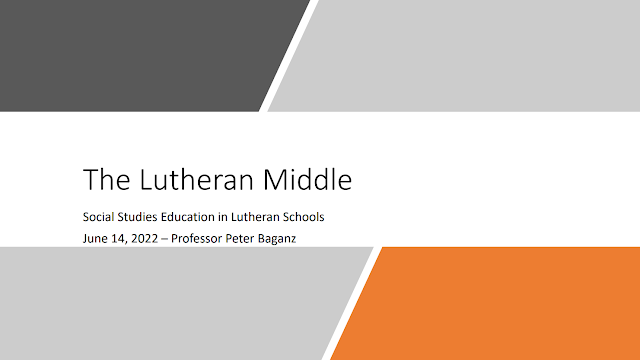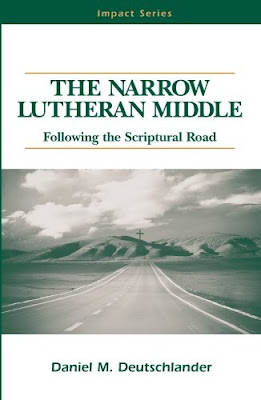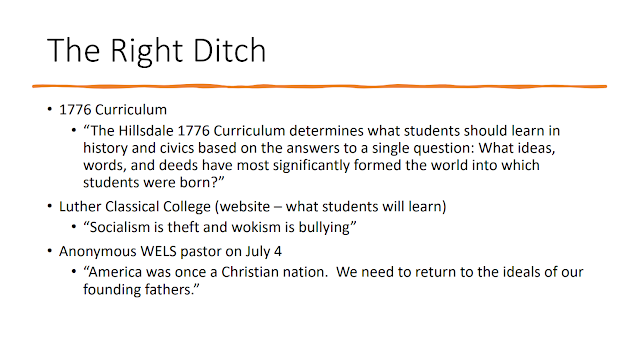Woke in the WELS: Martin Luther College #4: The (woke) Lutheran Middle
To round out the MLC arc of "Woke in the WELS" we will be taking a look at a presentation by Professor Peter Bangaz at MLC. The presentation is entitled "The Lutheran Middle" and riffs off the title of a fairly well-known book by a well-loved Seminary Professor, Daniel M. Deutschlander, "The Narrow Lutheran Middle." As you might imagine the book talks about the tension in many theological principles, and how we as Lutherans navigate them.
On to slide 8:
Winsomeness strikes once again! Addressing points 1, 3 and 5:"From the discussions of the learners, the Generative Words written by a team of facilitators were resources, money, abundance, crude oil, stealing, pocket, begging, plenty, poverty, suffering, frustration, crying, hunger, crisis, dying, death. These words were later depicted in pictorial form showing the concrete realities and situations in the lives of the people. The pictorial display provoked an emotional state of pity and anger among the discussants, some of them could not talk, while most of them were moved to tears asking the question: Why! Why! Why! Why!"
Freire was to teach men how to read, and instead he co-opted the education to awake their 'critical consciousness' and drive them to anger. This is a form of bullying. We see similar bullying today in DEI, anti-bias and anti-racist training, which all stem from 'wokism' or critical consciousness, for example in the form of CRT. It's not only the white males who are bullied, but it is the young women who, once happy, are convinced they are oppressed by men. Or our children going through puberty who are confused and figuring out what is going on with their bodies who are convinced they are transgender or homosexual, another form of abuse.
But don't take my word for it. Here's an extended quote from Andrew Doyle's book The New Puritans:
"The question of whether or not 'wokeness is the new religion' is unlikely to feature as a topic for debate these days. For all its flaws, the analogy is now commonplace and many pundits speak freely of the 'religion of social justice' without any need for further qualification. Culture warriors of all stripes have become increasingly doctrinaire and sectarian. Many of them favor slogans as a substitute for thought, almost as a form of holy writ. They have their own esoteric language, originating in largely outdated postmodernist jargon, and enshrined in foundational sacred texts by the likes of thinkers such and Michel Foucalt and Judith Butler, or the intersectional theories popularized by Kimberle Crenshaw. And although heretics are unlikely to be burned at the stake, their inquisitors are convinced that non-believers must convert for their own good.
All of this abouts to the legitimization of bullying on a grand scale."
We'll skip the "Controversial Topics" section. Several are legitimate, several are dumb to try and make into controversies. But I'll leave you with a real doozy on slide 18:
Is this history professor really categorizing the three-fifths compromise as a form of "racial inequality"? Slaves could not vote and counting slaves as population for the purposes of apportioning the House of Representatives would inflate the power of the white slave-holding states by increasing their representation in the House and increase the number of presidential electoral votes held by slave-owning states. Counting slaves as a fraction is not dehumanizing the person, it is limiting the political power of slaveholders. To be clear, the only place where the value of a slave was three-fifths was in the apportioning of the House. The fact that this was not a form of "racial inequality" is further demonstrated by the fact that free Blacks were counted as a full person and had full voting rights.





Comments
Post a Comment